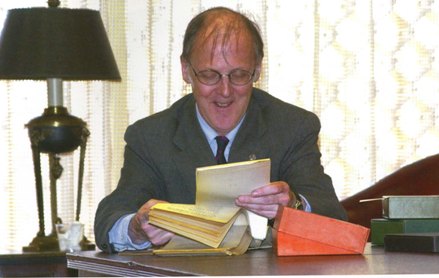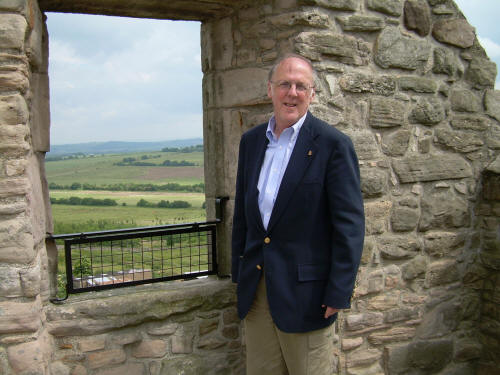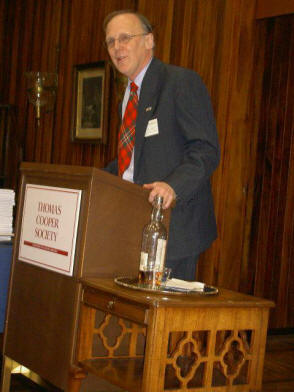|
Edited by Frank R. Shaw, FSA Scot, Dawsonville, GA, USA
Email:
jurascot@earthlink.net
Since beginning my Scottish quest in the
mid-1990s, it has been my pleasure to meet some mighty wonderful people who
have assisted me in writing articles, purchasing Scottish books, offering
sound advice when asked and, more than anything else, sharing friendships.
Dr. Patrick Scott is one who stands tall in all four categories.
I have watched Patrick over the years and can
say, without a doubt, that there is no one more dedicated to their
profession than he. He is an asset to the University of South Carolina,
where he is Director of Special Collections at the library, working with
Ross Roy and the Roy Collection, and Professor of English. What he brings
to the job, money cannot buy. His only motivation is to excel at his work,
and he does so with honors! On top of all of that, he is a gentleman. It is
a joy to bring you the Immortal Memory Dr. Scott delivered at the Atlanta
Burns Club on January 24, 2009.
TO THE
IMMORTAL MEMORY OF ROBERT BURNS
on the 250th Anniversary of his birth
Burns Club of Atlanta, January 24, 2009

Patrick Scott
Mr. President, Mr. Vice-President, friends, fellow-Scots,
fellow-Burnsians:
It is an
honour and a privilege to be invited to propose this long-traditional toast,
and it is a special honour to invited to do so, in this special anniversary
year, here among friends in this special place. For more than forty years
now, I have heard from people I admired and admire, older colleagues and
friends, of their proposals on such occasions, and I recognize that I am in
many ways unqualified. It should of course be my senior colleague, and your
honorary member, Ross Roy, proposing such a toast, and I know he sends his
greetings and good wishes.
I am a
little daunted, but I am not the first to be daunted by Burns. His first
editor and biographer James Currie confronted “with astonishment” “the huge
and shapeless mass” of Burns’s literary remains, “the complete sweepings of
his drawers and of his desk,” and famously felt himself to be unqualified,
“an entire stranger” to the man of genius he must describe. Burns’s
successor as poet of rural Scotland, James Hogg, sighed wearily as he began
his Burns biography, “So I am set down to write a memoir of the life of
Robert Burns,” and concludes even more defensively “As this is now the
seventh narrative that has been given to the world of this extraordinary
man’s life, it cannot be expected that I can produce anything new.” And the
best of the fourteen or more new books about Burns published so far this
year, Robert Crawford’s The Bard, from which more anon, reports a friend
warning him that a new Burns biography would be “the world’s least necessary
book,” and advises that anyone writing on Burns in Scotland today “requires
an instinct for self-defense and, ideally, a Kevlar vest.” But Currie, Hogg
and Crawford were undeterred, the blood of Braveheart perhaps flows in our
veins, and I shall take courage from their example.
I thought
at first of talking about what I know—Burns and his great gamble to become a
Poet, “To try my fate in guid, black prent,” and so talk about his books and
printing and the printed voice of his poetry. Burns almost uniquely,
certainly more completely than any other poet, brought together the spoken
and sung and printed voices, preparing for the survival of the poetic voice
in the coming age of an industrial book production, when the poetry of Burns
would ride a wave of social change and cultural innovation he could never
have foreseen. And now this week the image of Burns enters a Second Life
with the launch in Vancouver of a digital statue to the Bard. But such are
only the mechanics or infrastructure of immortality.

Burns himself had few
illusions about the accuracy with which future literary reputations might be
predicted:
'There's ither
poets, much your betters,
Far seen in Greek, deep men o' letters,
Hae thought they had ensur'd their debtors,
A' future ages;
Now moths deform, in shapeless tatters,
Their unknown pages.'
Of course
what happened to the ither poets didn’t happen to him. Future ages have
recognized their indebtedness to Burns, and his pages are certainly not
unknown. But he did not live to reap the rewards of his enduring. So,
skipping tactfully over the Bard’s parenthetical disdain for
“Colledge-classes” and higher education, I thought perhaps I should talk
about something more timely—if not the wealth of Burns, then The Wealth of
Nations, Burns as the contemporary of Adam Smith, and banks and bank
failures—his own life and his father’s having suffered by the collapse of
the Ayr Bank of Douglas, Heron in the 1760s,--and the shock this past week,
at 8 a.m. on January 18, 2009, seeing the Bank of Scotland, the first
Scottish bank, founded in 1695, finally going under to a London-based
take-over after 313 years of independence, though apparently retaining its
façade in Scottish high streets. Burns like his father before him knew
economic volatility. He had ploughed a stony furrow in youth, and worried
in his last years over the future of his wife and children. And like Adam
Smith in Smith’s second great work, The Theory of Moral Sentiments, Burns
saw the basis for life, as this Club notably does, not in markets alone but
in human relations, in sociability and fellow feeling. These are times
especially to value auld acquaintance, the hand of friendship, and a cup or
two of kindness. Burns would write election ballads in support of Patrick
Heron, son of that banking family whose failure had overshadowed his own
father’s life. But I thought that was an itch not yet ready to be
scratched.
So I
needed to back up a little and reflect, not just what I might say, but why.
I am a Scot of the diaspora, genetically diluted, linguistically challenged
and culturally deprived. My father was born and brought up in Edinburgh, a
fellow of the Edinburgh College of Surgeons, leaving that beautiful
precipitous city in 1929, on the brink of the last Great Depression, for
medical practice in an unlovely east Lincolnshire town where in due course
he met my mother. His father, my grandfather, was born in Edinburgh, and
educated at George Heriot’s Hospital, now famous as the original of
Hogwarts, right by the bus stop I used when I taught in Edinburgh nearly
forty years ago. His father, my great-grandfather, had walked into
Edinburgh seeking work in the early 1850s, from his father’s home in the
Lowther Hills, on the Dumfriesshire/Ayrshire border, the highest settlement
in Scotland, the leadmining village of Wanlockhead, where the rains beat
from the west over a walled graveyard full of James Scotts and Thomas Scotts
and William Scotts otherwise unknown to history. My genealogical brother
confronts in fact less a family tree than a family hedge, and like many
Scots, we have cousins and more distant kin in Canada and New Zealand and
the United States (including I must hope at some degree the Club’s current
president [William Scott Henwood]).
Yet as far
as I know none of my forefathers were Burnsians. They were all
bookish—little Wanlockhead had a library from the early 1700s,-- and they
were characteristically men of independent mind, but they were not Burnsians.
I now recognize that my father often quoted the pithier bits of Burns, but
without attribution. At Leicester in the late 1960s, I taught alongside the
dreamy Scottish poet G. S. Fraser, who had left Scotland after World War II
to earn a living in London, and when I knew him was just rediscovering
Burns, returning to a poet long tarnished for him by his martinet father’s
proprietorial advocacy. Those here tonight who learnt Burns father to son,
son to grandson, are greatly privileged. In 1970 I moved to Edinburgh, but
there Burns belonged to the growing number of Scottish literature
specialists; it was assumed, rightly, that a mis-education in England would
have taught me little or nothing about the greatest and most Scottish of
Scottish authors. It was less formally, through books lying round the house
from my American wife’s research and teaching in the School of Scottish
Studies, that I got to read Burns and about Burns. It was not till I moved
to South Carolina, and then not really till I began to work more closely
with Ross Roy and his great Burns collection, that I began to explore
Burns’s writings and life and the Burns literature, or to feel comfortable
talking about him with long-time Burnsians, who, however kindly, all seem to
know everything already, like the locals of Tanzania who on independence
took down the statue to Dr. Livingstone, Discoverer of Lake Nyasa, on the
ground their people had known about the lake all along and it didn’t need
rediscovering. Burns does not need rediscovering, or another statue, but a
comprehensive guide to what is already known about him would not be the
world’s most unnecessary book.
Yet my
long-wasted unBurnsian years, and my defensive urge to explain them, only
serve to exemplify a crucial difference between an English upbringing and a
Scottish education. When the rosy-cheeked urchins of a Victorian English
village were spoon-fed their Catechism, their first questions, like the
story I’ve told so far, were simple, empirical, social enough: What is your
name? followed in the second question by the gradual tightening round them
of the family and social net: Who gave you that name? In Scotland, however,
the luckless bairns, the six and seven-year-olds shivering on the hard
benches of some chilly kirk, were confronted with a question at once more
intellectual and more egalitarian: What is the chief end of man? Another of
my favourite Scottish authors, George Douglas Brown, from Cumnock, near Ayr,
once described a group of young farmers teasing one of their friends who at
a dance had been in animated and intimate conversation with the same girl
all evening. What, they asked him, had the couple talked about? “Och” he
replied (as people seem to, in late nineteenth-century Scottish stories),
“Och, it’s a grand topic, the freedom of the will.” In great things and
small, not just in religion, but in politics, and much much else, the
Scottish tradition is preeminently an intellectual tradition.
So let me
pass from autobiographical evasion to the harder question, ritual perhaps at
this annual feast, but salutory nonetheless. Why does Burns have an
“Immortal Memory”? Why should we here tonight in Atlanta like thousands of
others around the world be once again commemorating a poet nurtured in one
of the poorer and smaller if prouder and more distinctive countries of
Europe—in what a self-critical Scotsman once described (inaccurately) as “a
little shabby scraggy corner of a remote island, with a climate that cannot
ripen an apple”? (Edinburgh Review, 1824). Why did it ripen Burns? David
Hume, one of those Scots who, we are told, invented the modern world, posed
much the same question: “Is it not strange,” Hume asked, “is it not strange
that at a time when we have lost our independent government . . . [when we
are] unhappy in our accent and pronunciation; speak a very corrupt dialect
of the Tongue which we make use of; is it not strange, I say, that in these
circumstances, we should really be the People most distinguish’d for
Literature in Europe?” Yet for all the trials of Scottish life and culture
over the past 250 years, for all the eroding and absorbing power of a larger
and usually richer neighbour, Scotland is still and increasingly proud of
its literary heritage, and Burns is commemorated more today than ever. Well
over a thousand separate Burns Suppers have been registered this year on the
Scottish government’s official web-site, and there are gatherings like this
from Cape Town to Copenhagen, from Singapore to Sierra Leone, from
Vladivostock to Vancouver.

Patrick at Craigmillar Castle near Edinburgh
The
reasons for the reverence in which Burns is held are twofold—it is a tribute
to his poetic genius and also a recognition of him as national icon. Of his
poetic genius, his inexhaustible quotability, I need speak here only
briefly. Burns was a writer with an enormous range of different gifts, in
whom one is constantly finding new good things, who can express a whole
variety of different feelings and ideas, who nonetheless has a distinctive
character and voice of his own, feelings and ideas for each life-stage and a
myriad of life-experiences, yet who is constantly being simplified by those
who would claim one or another gift or trait as the “real” poet or the
“real” Burns. He eludes all such attempts. Burns first became known
locally as wit and satirist, and his satires have long outlasted the local
events and personalities in which they originated. He first attracted wider
recognition, however, as a poet who celebrated the humble life and common
experiences of rural Scotland—as Henry Mackenzie’s “heav’n-taught
ploughman.” We all know how partial and limiting a label that became. Think
only of the archetypal ploughman poem, “To a Mouse,” and then think of its
complex interweaving of experience and empathy with philosophical
reflection: the conversational tone of the first stanza:
Thou need na start awa sae hasty
Wi' bickering brattle!
I wad be laith to rin an' chase thee,
Wi' murdering pattle!
mutating into the quasi-parodic
philosophy of the second:
I'm truly sorry
man's dominion
Has broken Nature's social union,
I didn’t
know till just last week, when I read it in Crawford’s new book (and I’m
comforted that neither Jim Montgomery nor David Morgan Jones knew it
either), that the famous opening of “To a Mouse” takes its most famous
adjective from Burns’s early reading of John Ray’s The Wisdom of God
Manifested in the Works of Creation, which Ray asserts “make provision for
the preservation and security of weak and timorous creatures.” Burns had
read the book years before and the word had stuck. Pace Mackenzie, Burns
was never a bumpkin, but nor was he a plagiarist. He assimilated. Those
contrasted first stanzas might seem to bifurcate Scots experience and
English-language philosophizing, but the first famous phrase of the poem
shows them as one culture, not two, nesting the philosophic echo within the
firsthand observation (“cowran, tim’rous beastie”) till the inexorable
coulter of modern scholarship came along to expose it. And experience and
the philosophical make one culture also in the poem’s great conclusion:
The best-laid schemes o' mice an' men
Gang aft agley,
An' lea'e us nought but grief an' pain,
For promis'd joy!
. . . och! I backward cast my e'e,
On prospects drear!
An' forward, tho' I canna see,
I guess an' fear
And that
great conclusion is simple mainstream spoken Scots, the spoken tongue not
the written language. Similarly, Burns’s address to the food he made
Scotland’s national dish, as we have heard tonight, is Scots, not English.
Its celebration of the “sturdy Rustic,” like Burns’s compassion for the
field-mouse, and his longer and more ambitious celebration of the idealized
cottar’s Saturday night with the family—honest porridge and heart-felt
prayers—all made an impact far beyond Scotland herself, as expressing and
valuing everyday experience, local community life, rather than metropolitan
culture. The Cottar is sometimes brushed aside as anglified and
sentimental, Gray’s Elegy warmed over, but I was very struck recently by the
farmer’s return home after work;
At length his lonely cot appears in view,
Beneath the shelter of an aged tree;
Th' expectant wee-things, toddlin, stacher through
To meet their dad, wi' flichterin' noise and glee.
The word
‘dad’ long precedes Burns’s day, and is not even exclusively Scots, but this
is I believe the first time a major poem used the word ‘dad’ convincingly.
We all know such moments of experiential truth are but a single strand in
Burns’s writing. As I’ve suggested, he was never simply a rural poet. He
had profited from the Scottish zeal for the “democratic intellect.” His
satires, and verse-epistles, and occasional poems, and political songs, and
election addresses, all show a well-stocked mind as well as a characteristic
voice. But those moments of recognition remain magical.
From all
this variety of poetic skill, all this well-assimilated intellectual acuity,
Burns turned more and more to writing and rewriting songs. Some of his
songs were satiric, true; some bawdy, true also; some were historical
ballad-pastiche, perhaps, but good ballad-pastiche; some now seem a bit
drawing-room-pretty, maybe; but greatly and centrally Burns’s songs were the
lyrical expression of traditional feelings, mainstream feelings, about love
and landscape and hope and betrayal and parting and, recurringly if
surprisingly, loneliness. There is a haunting strand of melancholy running
through Burns’s writing. I shall not dwell on it on this most sociable of
occasions, but I mention it merely to show that there are still perhaps
other Burnses to be discovered or explored, new shadows to be added to the
familiar portrait.
For most
of the last years of Burn’s brief life he was collecting the surviving songs
of the national tradition, with far fewer new poems in other genres. It is
surely through the songs that he is now best known, and it is for them that
he is remembered not just as poetic genius but also as Scotland’s national
bard. Burns’s intense awareness of national identity spoke to readers the
world over, especially in the early nineteenth-century as Romantic
nationalism swept across Europe and beyond. Perhaps such a national identity
could only ripen in a country where nationhood was, to some degree,
threatened. Burns’s articulation of Scottish identity provided the model
round which other peoples articulated their nationality, not only in his own
period but through the Revolutions of 1848 in Europe and on to the new
nationalisms of the twentieth century. This side of Burns spoke, as it
still speaks, to the Scots of the diaspora, to us—there are we are told over
thirty million people of Scots descent in the United States alone. And with
devolved government in Scotland, and the opening of the Scottish assembly or
Parliament at Holyrood, Burns’s songs have an increased national edginess in
Scotland as well.
Burns as
national icon, patriot bard, the voice of national identity, speaks to
people of many nationalities, not just to Scots, and still speaks in an age
when national boundaries and identities seem to blur. He is a national poet
but also a global poet. He lived in dangerous times, times of revolutions
both good and horrific, through from the hopeful 1780s to the fearful 1790s,
the years, Crawford tells us, that first coined the word terrorist. At his
best Burns took the long view. His was a poetry that looked forward, not
just backward, in words that are still moving and inspiring, hopeful without
being merely sentimental:
Then let us pray that come it may
(As come it will for a' that)
That Sense and Worth o'er a' the earth
Shall bear the gree an' a' that!
For a' that, an' a' that,
It's comin yet for a' that,
That man to man the world o'er
Shall brithers be for a' that.
It is
right on this occasion to remember that the same blend of hope and realism
that Burns asserted for the future of mankind he also asserted about himself
and his future reputation, neatly anticipating what surely has indeed been
the verdict of history on his amazing life and his equally amazing
achievement:
'He'll hae misfortunes great an' sma',
But ay a heart aboon them a'.
He'll be a credit till us a':
We'll a' be proud o' Robin!
And it is characteristic of his achievement that the verdict he
imagined gossips passing on his own life is one any of us could wish also
for ourselves, a heart aboon misfortunes and a life of credit to others.

Our
commemoration tonight is in a long tradition, and we need not doubt that
there is credit due and greatness to be commemorated. In the Scottish
Borders and Highlands, as in the Appalachians and many other mountainous
countries, the traveler in older times, traveling on foot or by horse, was
guided over hilly countryside by heaps of stones, cairns. Cairns are
landmarks, and they are also often commemorative of a person or an event.
It was the custom, the duty, of each passing traveler to help maintain the
cairn against the ravages of time and weather by adding a chuckie, a single
small stone.
Our
commemoration tonight adds our stone, our chuckie to the cairn. So I ask you
now to be upstanding, and to raise your well-charged glasses, to Robert
Burns, to poetry, to Scotland, and to the IMMORTAL MEMORY. |

